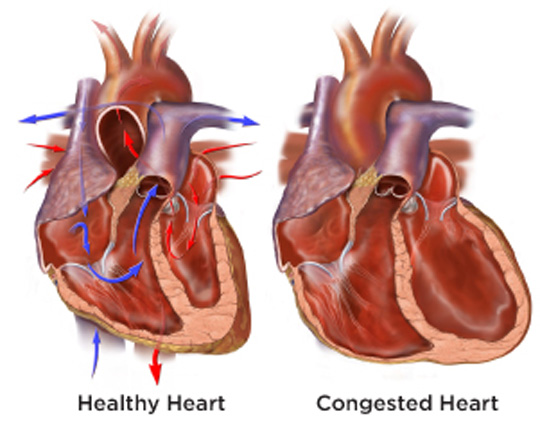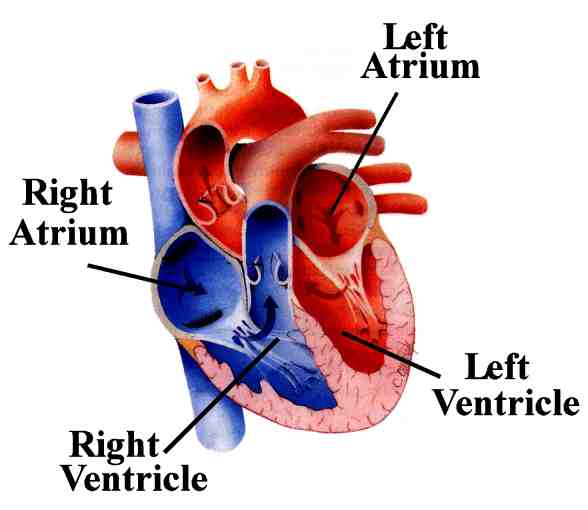 In heart failure, the ability of the heart to pump blood is not as strong as normal, which causes an increase in pressure in the heart and results in blood moving throughout the body more slowly than it should. It does not mean that the heart no longer works. When heart pressure goes up and movement of blood slows down, the body does not get as much oxygen or as many nutrients as it needs.
In heart failure, the ability of the heart to pump blood is not as strong as normal, which causes an increase in pressure in the heart and results in blood moving throughout the body more slowly than it should. It does not mean that the heart no longer works. When heart pressure goes up and movement of blood slows down, the body does not get as much oxygen or as many nutrients as it needs.
In the US, nearly 6 million people experience heart failure, with approximately 670,000 new cases each year. In people over the age of 65, heart failure is the number one cause of hospitalizations.
What Is Congestive Heart Failure (CHF)?
 Your heart is made up of four chambers: two at the top known as atria, and two at the bottom known as ventricles. The atria move blood from your body back to your heart, and the ventricles pump blood from the heart to other areas of your body. CHF occurs when your ventricles are unable to pump enough blood to your tissues and organs. This chronic condition causes your lower body, liver, lungs, and abdomen to become backed up with blood and other fluids.
Your heart is made up of four chambers: two at the top known as atria, and two at the bottom known as ventricles. The atria move blood from your body back to your heart, and the ventricles pump blood from the heart to other areas of your body. CHF occurs when your ventricles are unable to pump enough blood to your tissues and organs. This chronic condition causes your lower body, liver, lungs, and abdomen to become backed up with blood and other fluids.
The left ventricle is responsible for pumping blood to the body and is the heart chamber that is most commonly affected by CHF. Left ventricle CHF can cause breathing problems because of the build up of fluid that can occur in the lungs.
The right ventricle pumps blood to the lungs. When this chamber is impacted by CHF, fluid is retained in vital organs, the abdomen and in the lower extremities because of an accumulation of blood in blood vessels. The right and left ventricles may be affected at the same time or separately.
Symptoms of Congestive Heart Failue
It often does not cause symptoms until your health begins to decline. Gradual symptoms that indicate that you may be suffering from CHF are listed below.
Symptoms you may notice first:
- fatigue
- edema (swelling) of ankles, feet, and legs
- weight gain
- increased need to urinate, especially at night
Other symptoms may include:
- rapid or irregular heartbeat
- dyspnea (shortness of breath) when lying down or during exertion
- difficulty exercising
- ascites (swelling of the abdomen)
- persistent wheezing or coughing that produces a white or pink phlegm that is tinged with blood
- decreased alertness or difficulty concentrating
- nausea and lack of appetite
Be sure to see your doctor if you experience these symptoms of CHF. If you have already been diagnosed, or if your current symptoms get worse, call your doctor right away.
Seek urgent medical care if you have any of the following symptoms:
- severe and sudden shortness of breath combined with coughing up pink, foamy mucus
- chest pain
- severe weakness or fainting
- rapid or irregular heartbeat along with shortness of breath
Causes of Congestive Heart Failure
Health problems that impact your cardiovascular system are the major cause. It is very important to be monitored by your doctor and discover ways to reduce your risk of heart failure, including those listed below.
|
Factors |
Description |
|
Coronary Artery Disease |
It causes damage to the arteries that provide blood to the heart, which are known as coronary arteries. Fatty substances, such as cholesterol, block these arteries, causing them to narrow and restrict the flow of blood. |
|
Blood pressure |
High blood pressure, or hypertension, takes place when fat or cholesterol cause your blood vessels to become constricted, which makes it difficult for blood to travel through them. Age can also cause high blood pressure, which is measured in excess of 120/mm Hg. |
|
Excessive alcohol |
Longstanding alcohol abuse can lead to heart failure. |
|
Heart valve problem |
Blood flow is regulated by the heart valves, which open and close in order to allow blood to enter and exit the heart chambers. Disorders of the heart valves can cause the ventricles to need to work harder in order to pump blood throughout the body. |
|
Other causes |
Other causes of heart failure include thyroid disorders, disorders of the rhythm of the heart, and viral infections that cause heart muscle stiffening, and many more. |
Idiopathic (unknown) causes of CHF can occur, including following the recovery of myocarditis.
Congestive Heart Failure Treatment
Stage A
Stage A includes individuals who have pre-heart failure and have a high risk of developing CHF. It also includes those who have a history of alcohol abuse, rheumatic fever, or cardiotoxic drug therapy, a family history of cardiomyopathy, or who have been diagnosed with metabolic syndrome, diabetes, coronary artery disease, or high blood pressure.
- Treatment
Preventative treatments for this stage may include quitting smoking, stopping illicit drug use or alcohol use, and treating existing conditions, including high cholesterol or high blood pressure. Medications may be prescribed, including ACE inhibitors or ARB for those with a history of diabetes or other cardiac or vascular problems. These medications, as well as beta-blockers, may be recommended for patients who have high blood pressure or who have suffered a heart attack.
Stage B
Stage B CHF includes those who have been diagnosed with structural heart disease, including people who have valve disease, low ejection fraction, or who have had a heart attack, but who do not show signs of CHF.
- Treatment
Treatment for patients that fall into this category should be provided all treatments in Stage A. Your doctor may also consider valve repair/replacement surgery or coronary artery bypass surgery.
Stage C
Stage C includes patients who have been diagnosed with systolic heart failure, and who currently have or previously had symptoms of fatigue, difficulty exercising, and shortness of breath.
- Treatment
Heart failure treatment for these patients should include all treatments recommended for Stage A. Other treatments may include medications such as diuretics (water pills), an aldosterone inhibitor, hydralazine or nitrates, as well as discontinuation of drugs that may make CHF symptoms worse, restriction of fluids and sodium, and weight monitoring. Biventricular placing or implantation of a defibrillator may also be recommended.
Stage D
Stage D includes those who continue to suffer CHF symptoms after receiving treatment and have been diagnosed with systolic heart failure.
- Treatment
Treatments include all listed for stages A, B and C, as well as evaluation for the following treatment options: surgery, heart transplant, ventricular assist devices, research therapies, IV heart pump drugs and end of life care.
Congestive Heart Failure Prognosis
It is important to seek medical care as soon as possible if you at risk of developing CHF as a result of having other health conditions, such as hypertension or diabetes, or have experienced any symptoms of heart failure. The sooner you are diagnosed, the better the prognosis. Surgery and/or medication are viable treatment options for improvement.
